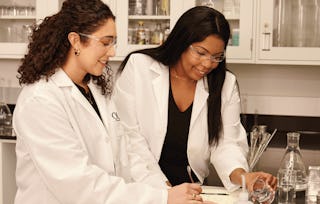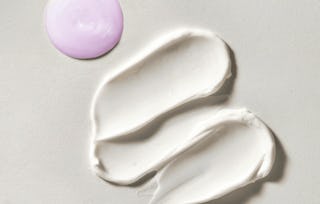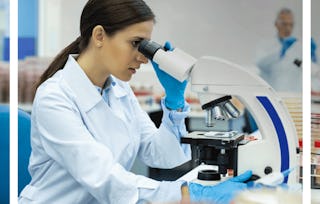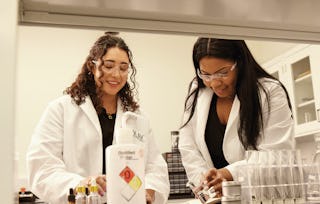Our first course, Introduction to Cosmetic and Skin Care Science, provides a bird's eye view of the cosmetics landscape, from cosmetics’ role in human culture and ancient remedies to the present-day multibillion-dollar industry. We aim to give you an overview of the historical, cultural, and technological aspects of cosmetic product development. We cover topics such as skin biology, skin conditions and treatments, cosmetic raw materials and choice of ingredients, and the scientific principles that drive the creation of a cosmetic formula. You will also get a strong sense of how important safety considerations are to ensure the wellness of our consumers.

Introduction to Cosmetic and Skincare Science
Ends soon: Gain next-level skills with Coursera Plus for $199 (regularly $399). Save now.

Introduction to Cosmetic and Skincare Science
This course is part of Introduction to Cosmetic Science and Ingredients Specialization

Instructor: Dr. Rolanda Wilkerson
30,427 already enrolled
Included with
(332 reviews)
Recommended experience
What you'll learn
Understand the evolution and cultural significance of cosmetics
Grasp fundamental skin biology and how it relates to skincare
Gain knowledge of safety standards for consumer wellness in cosmetics
Learn about cosmetic ingredients and their role in product formulation
Skills you'll gain
Details to know

Add to your LinkedIn profile
20 assignments
See how employees at top companies are mastering in-demand skills

Build your subject-matter expertise
- Learn new concepts from industry experts
- Gain a foundational understanding of a subject or tool
- Develop job-relevant skills with hands-on projects
- Earn a shareable career certificate

There are 5 modules in this course
In Module 1, we start by unfolding the history of cosmetics. We explore the cultural and technological evolution of cosmetics, from ancient rituals to contemporary practices. The landscape of the cosmetic industry is a walkthrough of the global market dynamics, stakeholders’ roles, and regulatory influences that define the current cosmetics landscape. We end this module by investigating cutting-edge technologies, sustainable initiatives, and the ever-evolving consumer preferences shaping the future of cosmetics.
What's included
10 videos5 readings4 assignments1 discussion prompt
In this module on skin biology, we delve into the intricate layers of the skin, including the epidermis, dermis, and hypodermis, to understand their crucial roles in maintaining skin health and function. Exploring the dynamic processes of skin aging, we analyze the impact of intrinsic and extrinsic factors on the skin's structure and appearance. Additionally, we investigate the intricate relationship between the skin and its microbiome, highlighting the pivotal role of diverse microbial communities in regulating skin health and immunity.
What's included
14 videos3 readings5 assignments
In the field of cosmetology, a comprehensive understanding of the categories of cosmetic raw materials is crucial. By considering the diverse functions of these ingredients and the intricate balance between synthetic and natural elements, one can navigate the ongoing debate around natural and synthetic cosmetic products. Careful considerations of ingredients in cosmetics help ensure the development of safe and effective formulations, fostering a holistic approach to product innovation and consumer well-being.
What's included
8 videos2 readings3 assignments1 discussion prompt
Grasping the fundamentals of crafting cosmetics is essential in the field of beauty products. It begins with understanding the process of creating various products for diverse consumer needs and preferences. However, it's not just about aesthetic appeal—ensuring their safety and longevity is crucial. This is why conducting thorough stability and safety assessments is vital to comply with regulations and ensure consumer satisfaction with the products.
What's included
9 videos4 readings3 assignments
Students can describe and identify four common skin conditions and how the cosmetics industry combats the harmful effect of sun exposure on our skin.
What's included
8 videos4 readings5 assignments1 discussion prompt
Earn a career certificate
Add this credential to your LinkedIn profile, resume, or CV. Share it on social media and in your performance review.
Instructor

Offered by
Explore more from Basic Science
 Status: Free Trial
Status: Free Trial Status: Free Trial
Status: Free Trial Status: Preview
Status: PreviewRutgers the State University of New Jersey
 Status: Free Trial
Status: Free Trial
Why people choose Coursera for their career




Learner reviews
332 reviews
- 5 stars
80.23%
- 4 stars
14.37%
- 3 stars
3.59%
- 2 stars
0.89%
- 1 star
0.89%
Showing 3 of 332
Reviewed on Jul 5, 2024
Great to have basic knowledge as introduction. Easy to understand
Reviewed on Aug 9, 2025
Amazing! Great if you are beginning to learn about cosmetic science!! <3
Reviewed on Feb 19, 2025
Although it's introductory course, it covers a lot of important basics. Great ?

Open new doors with Coursera Plus
Unlimited access to 10,000+ world-class courses, hands-on projects, and job-ready certificate programs - all included in your subscription
Advance your career with an online degree
Earn a degree from world-class universities - 100% online
Join over 3,400 global companies that choose Coursera for Business
Upskill your employees to excel in the digital economy
Frequently asked questions
To access the course materials, assignments and to earn a Certificate, you will need to purchase the Certificate experience when you enroll in a course. You can try a Free Trial instead, or apply for Financial Aid. The course may offer 'Full Course, No Certificate' instead. This option lets you see all course materials, submit required assessments, and get a final grade. This also means that you will not be able to purchase a Certificate experience.
When you enroll in the course, you get access to all of the courses in the Specialization, and you earn a certificate when you complete the work. Your electronic Certificate will be added to your Accomplishments page - from there, you can print your Certificate or add it to your LinkedIn profile.
Yes. In select learning programs, you can apply for financial aid or a scholarship if you can’t afford the enrollment fee. If fin aid or scholarship is available for your learning program selection, you’ll find a link to apply on the description page.
More questions
Financial aid available,

